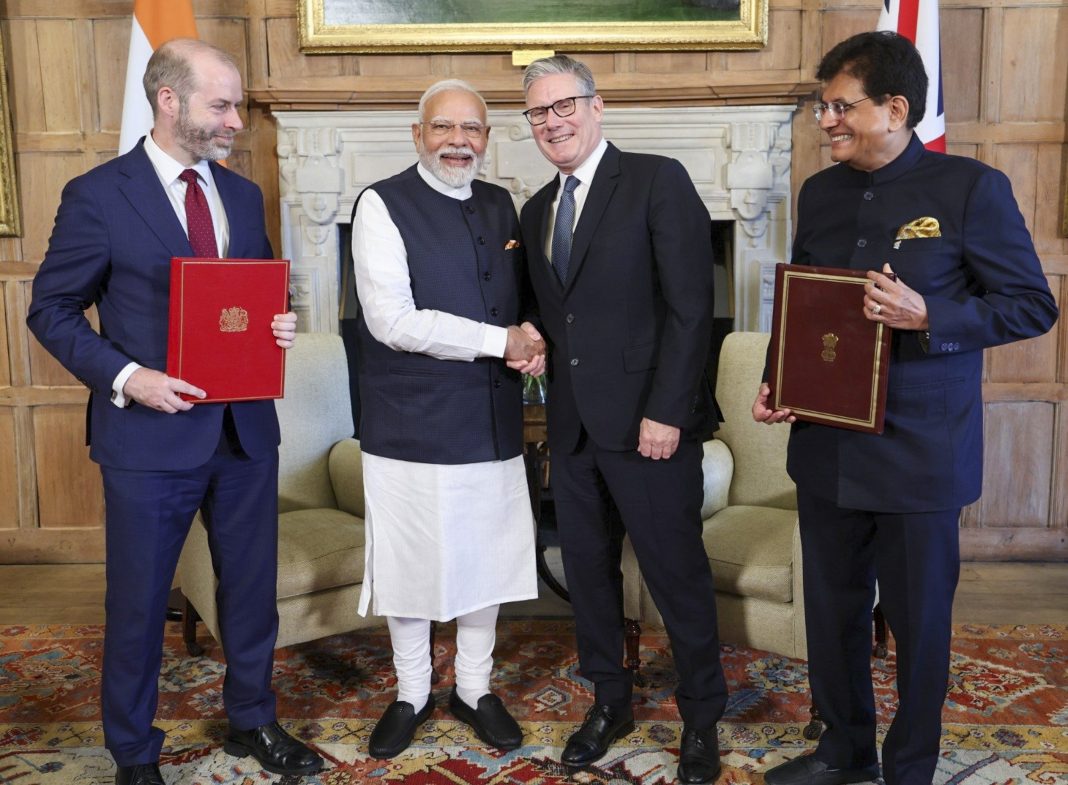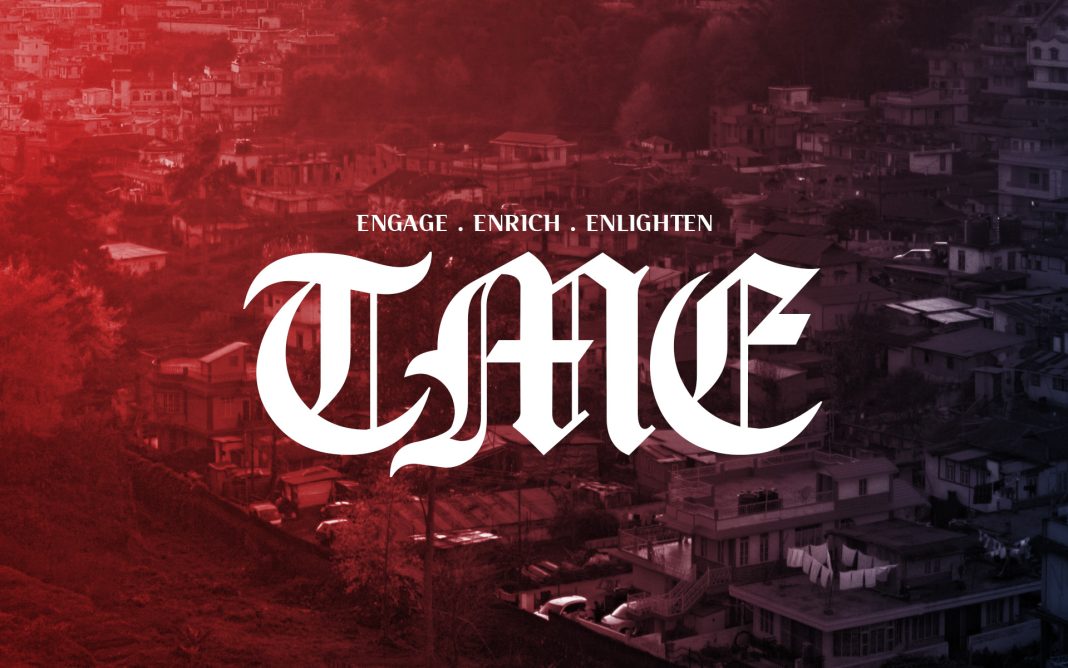London, July 24: India and the UK signed a landmark free trade agreement on Thursday, which, starting next year, will see 99 per cent of Indian exports enter the UK duty-free, while reducing tariffs on British products such as cars and whisky.
The deal, which comes days ahead of the US moratorium on higher tariffs coming to an end, aims to double the USD 56 billion trade between the world’s fifth and sixth largest economies by 2030.
While India has opened its market to various consumer goods, including chocolates, biscuits, and cosmetics, it will gain greater access to export products such as textiles, footwear, gems and jewellery, sports goods, and toys.
Also, Indian companies, such as TCS and Infosys, operating in the UK won’t have to make social security contributions for up to three years for employees who move from India.
Commerce and Industry Minister Piyush Goyal and his British counterpart Jonathan Reynolds signed the agreement at a ceremony in UK Prime Minister’s country residence Chequers.
Prime Minister Narendra Modi, who flew in to mark the occasion, hailed the pact as “a blueprint for our shared prosperity”.
“On the one hand, Indian textiles, footwear, gems and jewellery, seafood, and engineering goods will get better market access in the UK… On the other hand, people and industries in India will be able to access products made in the UK, such as medical devices and aerospace parts, at affordable and attractive prices,” he said.
In his remarks to the media, Modi said the UK and India are “natural partners” and said the nations were “writing a new chapter” in their history.
Prime Minister Keir Starmer termed it “the biggest and most economically significant” trade deal Britain has made since Brexit.
“The UK has been negotiating a deal like this for many years, but it is this government that got it done, and with it, we’re sending a very powerful message that Britain is open for business, and that is already generating huge confidence,” he said.
For India, the FTA represents its most significant strategic partnership with an advanced economy and could serve as a model for future agreements, including a potential deal with the European Union.
Under the pact, which has been termed Comprehensive Economic and Trade Agreement (CETA), tariffs on Scotch whisky will be reduced from 150 per cent to 75 per cent immediately, and further lowered to 40 per cent by 2035.
On automobiles, India will reduce import duties to 10 per cent over five years, down from the current rate of up to 110 per cent, under a gradually liberalised quota system.
In return, Indian manufacturers will gain access to the UK market for electric and hybrid vehicles, also within a quota framework.
India has provided duty concessions to the UK auto exporters only on large petrol and diesel vehicles and high-priced EVs, while protecting sensitive segments of the domestic automotive industry, especially mid and small cars and low-priced EVs, under the trade pact.
No concessions are given to electric, hybrid, and hydrogen-powered vehicles in the first five years of the agreement.
On the other hand, India will get duty-free access to several agri goods in the UK, such as fruits, vegetables, cereals, turmeric, pepper, cardamom, and processed goods like ready-to-eat food, mango pulp, pickles, and pulses.
Over 95 per cent of agricultural and processed food tariff lines will attract zero duty. Marine products such as shrimp, tuna, fishmeal, and feeds, currently taxed between 4.2 per cent and 8.5 per cent at present, will become completely duty-free once the pact comes into force. It may take about a year, as it requires approval from the British parliament.
In the textiles segment, India is facing a duty disadvantage vis-a-vis Bangladesh, Pakistan and Cambodia, which have duty-free access to the UK market. Now this FTA would eliminate the tariff on textile imports from India, thereby enhancing its price competitiveness in the UK market.
Products that are poised for exponential growth include RMG (ready-made garments), home textiles, carpets, and handicrafts, where the removal of duties would create competitive advantages.
India is expected to gain at least 5 per cent additional market share in the UK within 1 to 2 years of the implementation of the deal.
The pact also announced tariff elimination (from 18 per cent at present) for Indian engineering exports to the UK. It could help double domestic exports in the next five years to over USD 7.5 billion by 2029-30.
India’s exports of generic medicines and medical devices, such as X-ray systems and surgical instruments, will get a major boost with Britain agreeing on zero duty under a free trade agreement.
On the services front, the agreement will enable Indian financial services players to expand their footprint in Britain, enhance their competitiveness and serve the Indian diaspora and businesses.
For digitally delivered financial services, the UK has provided market access with respect to the various sub-sectors under both insurance and insurance-related, and banking and other financial services.
With regard to the insurance sector, the agreement is expected to enable non-life insurance services and insurance intermediation (maritime shipping and goods in international transit), reinsurance and retrocession, and services auxiliary to insurance to expand their operation in India.
India has also secured an agreement on the Double Contribution Convention, which will exempt Indian professionals and their employers from social security payments in the UK for up to three years, improving the cost competitiveness of Indian talent.
Commerce and Industry Minister Piyush Goyal said that it will provide duty-free access to several domestic sectors such as leather, electrical machinery and chemicals in the British market, thus unlocking nearly USD 23 billion in opportunities.
“Duty-free access for about 99 per cent of Indian exports unlocks nearly USD 23 billion in opportunities for labour-intensive sectors, marking a new era for inclusive and gender-equitable growth,” Goyal said in a post on X.
Commenting on the deal, India Inc said that the pact marks a transformative moment in the global economic landscape, laying down the blueprint for a modern, values-led partnership. (PTI)




